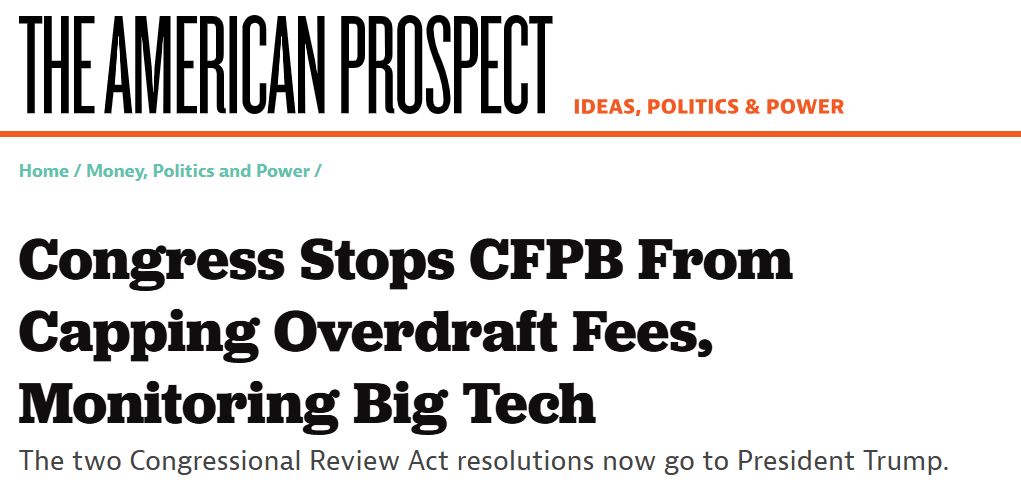Welcome to DU!
The truly grassroots left-of-center political community where regular people, not algorithms, drive the discussions and set the standards.
Join the community:
Create a free account
Support DU (and get rid of ads!):
Become a Star Member
Latest Breaking News
Editorials & Other Articles
General Discussion
The DU Lounge
All Forums
Issue Forums
Culture Forums
Alliance Forums
Region Forums
Support Forums
Help & Search
General Discussion
Related: Editorials & Other Articles, Issue Forums, Alliance Forums, Region ForumsCongress Stops CFPB From Capping Overdraft Fees, Monitoring Big Tech

https://prospect.org/power/2025-04-09-congress-stops-cfpb-capping-overdraft-fees-monitoring-big-tech/

The House of Representatives passed resolutions Wednesday that will nullify two Consumer Financial Protection Bureau (CFPB) rules. As a result, low-income customers will pay an estimated $5 billion more annually in overdraft fees, and Big Tech will get to pursue its ambitions to make payment apps and other financial services products with little regulatory oversight. The resolutions, which have already passed the Senate and will now head to President Trump, use the powers under the Congressional Review Act to reverse regulatory actions taken by executive branch agencies submitted after a certain date. Once passed, the CRA resolutions both nullify the rule and prevent agencies from taking “substantially similar” actions in the future. President Trump signed 16 CRA resolutions in his first term, and two so far in 2025.
The overdraft fee rule would have capped the fees, charged when customers attempt to withdraw more from their account than they have deposited, to $5. The average overdraft fee is closer to $35. The so-called “larger participant” rule gave the CFPB supervisory authority over non-banks engaged in digital payment app transactions, including companies like Elon Musk’s X, which has eagerly moved toward developing a financial services app. All House Republicans decided to reveal themselves as objectively pro-junk fee in supporting blocking the overdraft fee rule; only Rep. Ryan Mackenzie (R-PA) voted against the larger participant rule. Sen. Josh Hawley (R-MO) voted against both resolutions in the Senate, but no other Senate Republican did.
The overdraft fee rule was predicted to save Americans $5 billion per year, weighted overwhelmingly to poorer bank customers who are at risk of overdrawing their accounts. Bank lobbyists were unsurprisingly cited as the primary endorsers of killing the rule. For years, banks have been found to structure payments to generate more money from overdraft fees. Republicans have justified overturning the overdraft fee rule by saying they want to protect consumer choice, an old fallacy that banks have to rip off their customers or they cannot survive. Yet former CFPB director Rohit Chopra’s pressure on larger banks led to many dropping their overdraft fees entirely.
Now, the seal of approval from Congress to charge whatever price for overdrawing accounts could reverse that trend, while allowing those smaller banks that maintained the practice to continue. Arvest Bank, owned by the Walton family of Walmart fame, made 124 percent of their net income in 2024 from overdraft fees; they had filed a lawsuit to nullify the rule. The larger participant rule was a response to the growing trend of tech firms devising apps to help people store or move their money. Under the rule, the CFPB could add new companies to their roster for enhanced supervision, and send in examiners to monitor their services. The agency had added Google to that roster in December.
snip
3 replies
 = new reply since forum marked as read
Highlight:
NoneDon't highlight anything
5 newestHighlight 5 most recent replies
= new reply since forum marked as read
Highlight:
NoneDon't highlight anything
5 newestHighlight 5 most recent replies
Congress Stops CFPB From Capping Overdraft Fees, Monitoring Big Tech (Original Post)
Celerity
Apr 2025
OP
OAITW r.2.0
(31,491 posts)1. Congress or the Republican Party?
There is a difference.
Celerity
(53,669 posts)2. Straight party line on both, although Gottheimer voted Nay on S.J. Res. 28, but then did not vote on S.J. Res. 18
Do not know why, TBH.
F$$kers